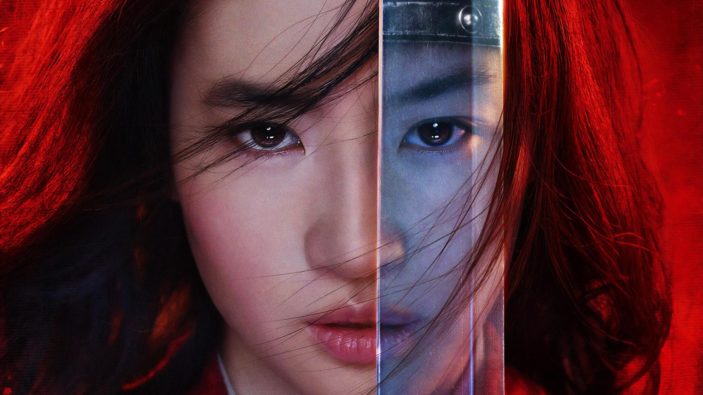
Given that the character of Hua Mulan has long been one depicted in poetry, novels, and film for almost as long as she has been a Chinese folklore figure, it’s wiser to view Mulan as another variation of her story, rather than a direct remake of Disney’s 1998 animated favourite.
Whereas recent Disney live-action overhauls of such catalogue titles as Aladdin, Beauty & the Beast, and The Lion King all rather faithfully (for better or worse) recreated their animated counterparts – musical numbers and all – Mulan is approached in more grounded manner, altering certain plot points, exorcising certain characters (sadly, no Eddie Murphy-voiced dragon), and removing the song-and-dance temperament; although this 2020 version does ring in Christina Aguilera, who has re-recorded a version of the animated film’s signature ballad “Reflection” for the signature credits roll.
When the film begins, we’re introduced to a young Mulan gliding along the rooftops of her village, effortlessly displaying her strength, fearlessness and warrior-like abilities. It’s a cute sequence (she’s chasing a rogue chicken) that sets up the character’s natural strength, whilst lining out the dynamic between her and her more traditionally-mindset family. As she grows older, Mulan (Liu Yifei) has only become more headstrong in wanting to hone her chi, something her father (Tzi Ma) and mother (Rosalind Chao) wish for her to conceal so that she can settle down accordingly and be matched with a potential husband.
When it’s decreed by the Chinese Emperor (Jet Li) that every household must send one man to fight in an impending invasion – overseen by the cartoonish villain Bori Khan (Jason Scott Lee) – it sets off Mulan on her chosen path as she sneaks away in the middle of the night with her father’s horse, armour, sword, and conscription papers in her bid to save him from having to join the army himself. Whilst the animated tale then fell into a more lighthearted view of this, earning comedic value out of the awkwardness of a female in a male-only camp, here director Niki Caro (Whale Rider, The Zookeeper’s Wife) tones down things considerably, taking a more natural approach to the situation.
Where the film opts to embrace a more supernatural mindset is with the character Xian Lang (Gong Li), a vengeful witch who works as the right-hand to Bori Khan (though it’s evident neither of them entirely trust the other). What easily could have been a character of little importance, tailored almost stereotypically to the frame of the fearsome woman, she ultimately emerges as Mulan’s most investing aspect. She transcends the description of the villain, with a kindredness to Mulan that suggests they’re more alike than they wish to acknowledge. Liu has a welcome naturality to her turn as Mulan and carries the film with ease, but Gong is truly the film’s star.
Next to Gong’s shape-shifting antagonist, the lush cinematography and expertly-designed action sequences are where Mulan shines. Given that this is a plentifully budgeted affair (it allegedly cost $200 million to make) the big screens of today’s cineplexes are ultimately where this movie was always designed to be seen. Whilst it is understanding that Disney want to please the masses and earn some coin where they can during these trying times – hence its premium price access on Disney+ – it’s a shame the film can’t be experienced in the format as intended.
Whilst the film has had its share of controversies in the lead up to its release – with Liu’s views on the Hong Kong protests sparking word that she supported police brutality, and the removal of the animated character Captain Li Shang earning backlash from the LGBTWQ community who suggested Shang’s relationship with Mulan’s male alter-ego was representative of a bisexual attraction (the film’s producer reasoned that Shang was removed from the script in response to the #MeToo movement, as his role as Mulan’s commanding officer suggested an unhealthy power dynamic) – it’s ultimately a harmless affair; and the film does hint at an attraction between Mulan’s male alter-ego and fellow warrior Chen Honghui (Yoson An) during their training in the lead-up to battle.
A little slow to start, though eventually finding its energetic footing, Mulan may not break the mould within its genre, but it at least opts to be more than just a carbon copy of its animated counterpart. A family-friendly product that continues to champion women both behind and in-front of the camera, Disney’s latest won’t satisfy the musically-inclined but it’s more traditional mindset means it can stand on its own.
![]()
![]()
![]()
![]()
![]()
THREE STARS (OUT OF FIVE)
Mulan is available to stream now on Disney+ at a premium access price of $34.99.
